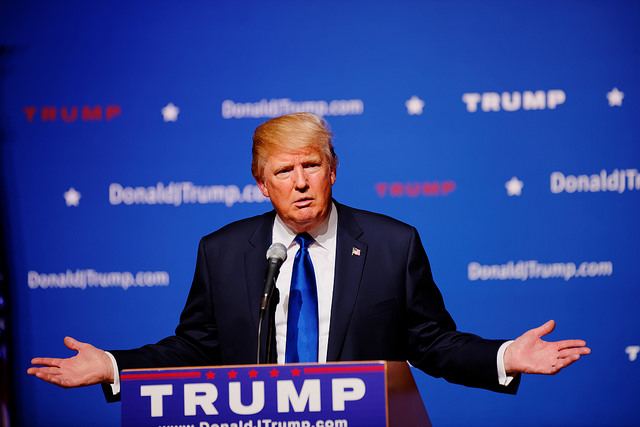Like this article? rabble is reader-supported journalism. Chip in to keep stories like these coming.
Is the era of political parties nearing its end? In the U.S. neither Donald Trump nor Bernie Sanders has a history in the parties they’re vying to lead. They’re recent arrivals. It doesn’t seem to matter; in fact, it might help. Their lack of party connectivity may embody the movement of history.
Take Trump. It’s not just that what he says isn’t remotely Republican or conservative; he doesn’t even try. He’s effectively “left” in opposing free trade, which has been the Republican brand since Reagan. He denounced the Republican-instigated invasion of Iraq and did so almost casually, as if it came to him in mid-debate.
Can you picture the Clintons (party creatures to their core) agonizingly trying to “triangulate” over such risky stances? It’s unthinkable that any normal party hack (i.e. all Trump’s opponents) could trash party war heroes like John McCain and get away with it. But Trump is home free because he’s not playing the party game, though the game he’s playing is happening in a party.
His positions don’t so much challenge party culture as ignore it. It’s less like he’s taken over the Republican party than rented it for an election and plastered the Trump name on it as he does on buildings he didn’t build (The Trump Power). This isn’t party politics in any familiar sense.
Sanders is similar. He hung around with Democrats, nothing more. Now he’s the only challenger to Hillary. Barack Obama, by contrast, eight years ago, arrived through the usual party initiation process. He started off in the state Democrats, got invited to donor cocktail parties and eventually joined the club.
The same transformation is happening elsewhere. In Europe, parties that didn’t exist a few years ago (Syriza in Greece, Podemos or Ciudadanos in Spain) contend or win on their first try. They don’t spend decades or centuries building a base and acquiring credibility. What’s stunning is the speed of their rise.
Parties simply aren’t what they used to be. What were they? Formidable social institutions: pillars like churches and service clubs, or bowling leagues. Local party bosses got people jobs and helped them through hard times. Individuals based their opinions on time-honoured party traditions. You were for or against, say, free trade, because your family had always been Liberal or Tory.
Now? Politics is less about party affiliation and more about entertainment. You go to a party event not to verify who you are (the way you attended church) but for diversion and fun, like a hockey game or concert.
It’s disorienting. All that’s solid melts into air, as Marx deftly phrased the modern experience. It might ameliorate the vertigo to recall that parties weren’t always there. Greek democracy knew no parties. They arose in Britain in the late 1600s as part of a conflict over who’d be king: a Catholic or a Protestant. U.S. founding fathers like Jefferson deplored parties. They were disparagingly called “faction.” Institutions that seemed to be designed at the dawn of time to last forever, can vaporize and be hard to recall. But really, parties have only been around a short time historically, and are at least questionably democratic.
I confess I’ve always had a hellish time grasping the point of parties. I’ve queried people I respect who were conservative (Dalton Camp) or leftists and revolutionaries (under third-world dictatorships) and teachers (Hannah Arendt). They all provided excellent reasons for parties and passionately insisted they were necessary. So I assume it’s my problem, I’m somehow blocked. But now, if parties are on the edge of extinction, the question may be irrelevant.
One redemptive element in the Trump nexus is that he seems uninterested in building a party apparatus. That’s what makes him not quite a fascist, though he has the racism, demagoguery etc. Fascism requires its own party along with militias or brownshirts to enforce its political vision. But Trump seems largely oblivious to politics, he’s a guy with a limited attention span who mainly wants everyone else to look at him. So he’s content to inhabit the moribund corpus of the GOP. If we’re really at the end of the era of parties, then this unconcern with party building works for him along with almost everything else he touches.
For those though, who care about politics, it leaves a question: what on earth might democratic politics look like without parties?
This article was first published in The Toronto Star.
Like this article? rabble is reader-supported journalism. Chip in to keep stories like these coming.
Image: Flickr/Michael Vadon



